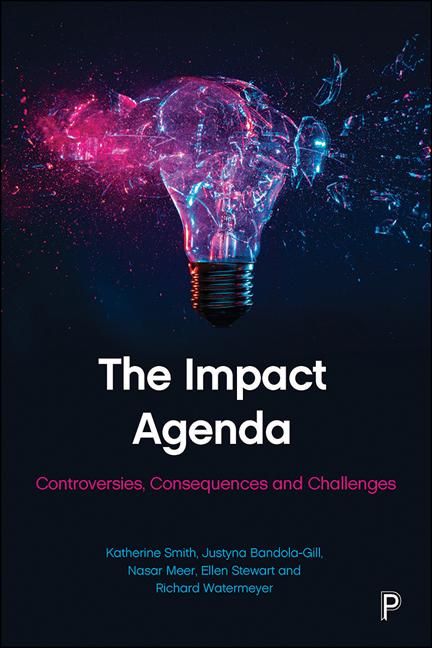Book contents
- Frontmatter
- Contents
- List of figures, tables and boxes
- List of abbreviations
- Notes on authors
- Acknowledgements
- 1 Introduction: Critical Reflections on Research Impact
- 2 The Rise of Research Impact
- 3 Debating the UK Impact Agenda
- 4 Do Experiences and Perceptions of Research Impact Vary by Discipline?
- 5 Impact on whom? Contrasting Research Impact with Public Engagement
- 6 Public Intellectualism and the Impact Agenda: International Perspectives
- 7 Academic Life in the Impact Vanguard: The View from Knowledge Exchange Organisations
- 8 Looking Back: Evolving Public Health Perspectives on Research Impact
- 9 Telling Tales of Impact: As Seen Through the Eyes of User Assessors
- 10 Conclusion: What Would an Evidence-Informed Impact Agenda Involve?
- References
- Index
2 - The Rise of Research Impact
Published online by Cambridge University Press: 23 February 2021
- Frontmatter
- Contents
- List of figures, tables and boxes
- List of abbreviations
- Notes on authors
- Acknowledgements
- 1 Introduction: Critical Reflections on Research Impact
- 2 The Rise of Research Impact
- 3 Debating the UK Impact Agenda
- 4 Do Experiences and Perceptions of Research Impact Vary by Discipline?
- 5 Impact on whom? Contrasting Research Impact with Public Engagement
- 6 Public Intellectualism and the Impact Agenda: International Perspectives
- 7 Academic Life in the Impact Vanguard: The View from Knowledge Exchange Organisations
- 8 Looking Back: Evolving Public Health Perspectives on Research Impact
- 9 Telling Tales of Impact: As Seen Through the Eyes of User Assessors
- 10 Conclusion: What Would an Evidence-Informed Impact Agenda Involve?
- References
- Index
Summary
In this chapter we consider early and evolving rationalisations, the conceptual underpinnings and historical antecedents of an impact agenda in the UK. We note also the salience and exportability of the UK's impact agenda as a policy with growing appeal and traction across the international higher education community.
The emergence of research impact as an idea
The emphasis on research impact has been increasing steadily in the UK since the late 1990s (Cabinet Office, 1999), intensifying in a context of growing frustration that, despite apparently mutual political and academic interest in strengthening the links between research and policy, the actual use of evidence in policy remained limited (e.g. Katikireddi et al, 2011; Husband, 2016; Naughton, 2005). Academic critiques of policy often position responsibility for this dissonance on the policy side, noting the availability of relevant research that appears to have been ignored. Yet, the persistent sense of a large gap between research and policy has also served to intensify longstanding policy concerns about the lack of ‘return on investment’ from publicly funded research in UK universities.
As Chapter 1 outlines, one means of addressing this concern is that research impact now forms a significant section of grant application processes for all the major UK funding councils. This means that academics are required to set out how the work they will undertake will benefit non-academic audiences and what they will do to help achieve this in advance of undertaking the research, in the knowledge that this part of the application informs reviewer assessment. Meanwhile, in the run-up to 2014, it was decided that the system for nationally appraising university research, REF, would award 20 per cent of overall scores to institutions on the basis of impact case studies. This is rising to 25 per cent in the upcoming REF (REF2021, 2017). Hence, obtaining core research funding (largely distributed on the basis of REF scores) and project-specific research funding from UK research councils are now both strongly dependent on academics’ abilities to respond adequately to questions about the broader (non-academic) value of their work. These changes represent the contemporary backdrop for this book.
- Type
- Chapter
- Information
- The Impact AgendaControversies, Consequences and Challenges, pp. 13 - 26Publisher: Bristol University PressPrint publication year: 2020



